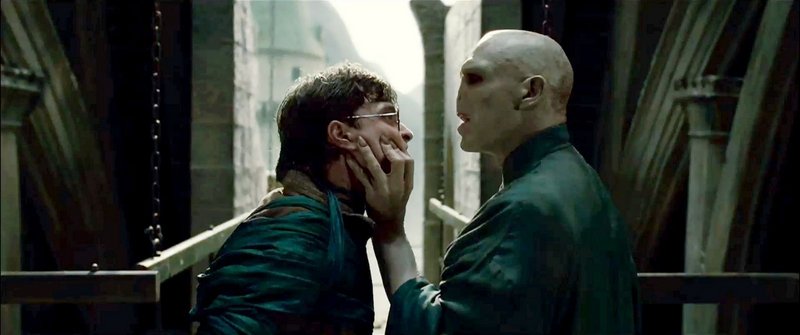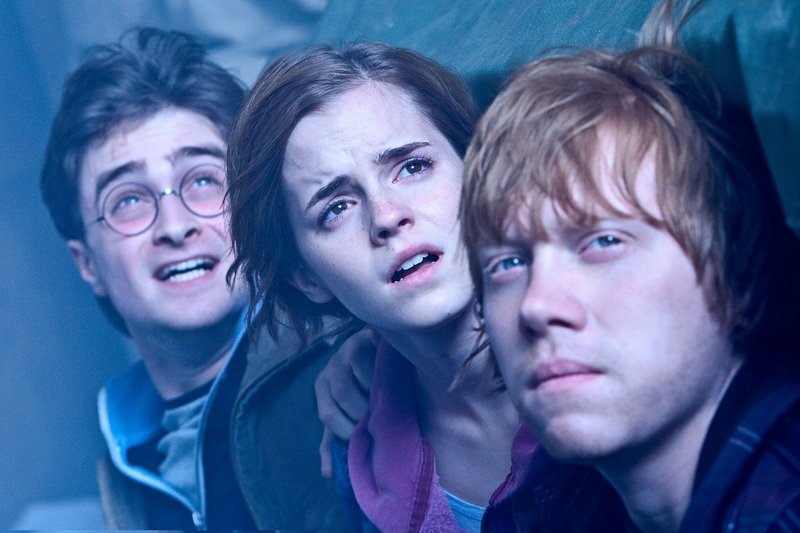If you lived through the Age of Enlightenment, you probably didn’t know it. Likewise, the Age of Reason. Or the Age of Innocence. But the Age of Harry? For Muggles not to know they’ve been living through the Potter Era would be like not noticing a Hogwarts’ commencement exercise marching through their living room. Or the noseless Voldemort sitting in the breakfast nook.
When “Harry Potter and the Deathly Hallows Part 2” opens Friday (actually midnight tonight at many theaters), it will mark the end of something — though probably not entirely the enchanted Pottermania that has made the series the most popular in film history. And which has helped sell 450 million copies of the seven J.K. Rowling novels on which the movies are based.
Certainly, when the second half of the last movie is finally released Friday — in 3-D, which was still more or less a novelty when the inaugural “Harry Potter and the Sorcerer’s Stone” was released in 2001 — it will free Daniel Radcliffe (age 21), Rupert Grint (22) and Emma Watson (21) from the characters that have defined their young lives (and made them, one hastens to add, financially independent).
It also will mean more free time for a big bunch of older British actors. And it will make finite, in a way, the Potter Generation: kids, many of whom are no longer kids, who read the books, saw the movies, were disappointed when they turned 11 and didn’t get an invitation to Hogwarts Academy, and will see the conclusion of the films as a bittersweet punctuation point on the entirety of their childhoods.
It’s been 15 years since the whole thing started (with the books), 10 since the movies began, and while David Yates hasn’t been on it that long, he seemed ready to leave the wizards behind. When the last installment was “98 percent in the can,” the director — the fourth to take on “Potter” (after Chris Columbus, Alfonso Cuaron and Mike Newell) — said he often met the same kind of question.
“‘With three directors before you, a book, other source material, what is it that you DO?’ ” Yates says, quoting his questioners. “And I say, ‘A lot, actually!’ But it goes back to that notion that it doesn’t belong to anybody. I can truly say this belongs to the audience; that’s what it feels like to me.”
Audiences would agree: The movies — which have made a tidy $6.4 billion for Warner Bros. — have 28 million Facebook friends, and the books have been translated into 60 languages. Rowling recently unveiled a website called Pottermore (pottermore.com), intended to develop characters and plot lines already in books and allow readers to interact with and navigate the wizardly world of Harry Potter. Pottermaniacs reportedly can register on the site July 31, Harry Potter’s birthday.
“Deathly Hallows” was originally intended as one movie but later split in two — ostensibly because the narrative was so fat (but no one missed the point that two movies are far more profitable than one). In it, Harry, Ron Weasley and Hermione Granger continue to search out horcruxes — objects that contain a fragment of a soul, and which the evil Voldemort (aka You Know Who, aka He Who Must Not Be Named, aka the Dark Lord) is using to both attain immortality and achieve total control of the Wizarding World.
What “Deathly Hallows Part 2” promises is an apocalyptic battle between the forces of dark and light, several untimely deaths and a denouement that will bring full circle Rowling’s subtle Christian allegories and politically nuanced metaphors about torture, “blood purity” and the corrupting effects of power.
Will Harry have a lasting effect on the culture? Undoubtedly. Fans have learned all sorts of terms specific to the seven novels — “hippogriffs” and “kneazles” are creatures, an “animagus” and a “mudblood” (though derisive) are people. The characters themselves have been so well-defined that we feel we know them — and people like them: Few young women would be insulted by being referred to as a “Hermione”; not everybody wants to be a “Weasley” (the perpetual second fiddle, despite his occasional act of bravery). Similarly, if you want to insult someone, call him or her a Dursley (along with members of their family).
The idea of Muggledom, too, is fraught with mixed interpretation: To be a Muggle means to be an outsider in the world of wizards, a forever-inferior creature who can never truly belong with Harry and his ilk. And yet, who ever felt that way about it? One of J.K. Rowling’s gifts is that she can create a world in which the exclusionary, magical nature of her characters — the thing that should have distanced them from their nonmagical audience — is the very thing that made the audience feel that it belonged. Harry could never vanish entirely, not even if he and his movies were somehow wrapped in a Cloak of Invisibility.
But the pang that hits the Potter People, when that final movie rolls to a close, will probably feel a lot like homesickness.
Send questions/comments to the editors.



